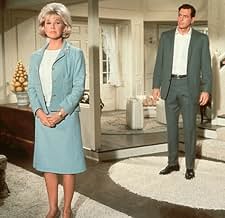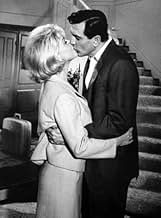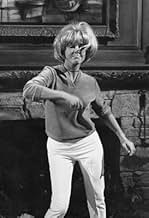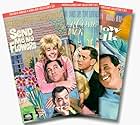AVALIAÇÃO DA IMDb
6,9/10
7,8 mil
SUA AVALIAÇÃO
Adicionar um enredo no seu idiomaWhen a hypochondriac believes he is dying, he makes plans for his wife--which she discovers and misunderstands.When a hypochondriac believes he is dying, he makes plans for his wife--which she discovers and misunderstands.When a hypochondriac believes he is dying, he makes plans for his wife--which she discovers and misunderstands.
- Direção
- Roteiristas
- Artistas
- Prêmios
- 1 vitória e 1 indicação no total
John Alban
- Commuter
- (não creditado)
Don Anderson
- Country Club Member
- (não creditado)
Shirley Anthony
- Country Club Member
- (não creditado)
Herschel Bernardi
- TV Announcer
- (narração)
- (não creditado)
Paul Bradley
- Country Club Member
- (não creditado)
- Direção
- Roteiristas
- Elenco e equipe completos
- Produção, bilheteria e muito mais no IMDbPro
Avaliações em destaque
One early morning around 1:00 AM I was seeing what was on TV and I started to watch Send Me No Flowers. I had no idea what it was, but when I saw Norman Jewison's name in the opening credits, I made a point to keep it on the channel. So then it gets to the wildly creative opening scene, with Rock Hudson in bed, looking miserable. There's a voice over asking questions about his ailments, and it comes off like a cough syrup commercial from 40 years ago. That one scene was creative enough to make me think "I don't care if the word 'flowers' is in the title, I'm going to watch this thing!" The story is funny as well. Hudson plays a hypochrondriac who thinks he's going to die. He decides to try and set his wife up with a new man in the few weeks that he believes he has left to live. I had never seen a Hudson/Day/Randall movie before. I enjoyed the chemistry between the three of them a lot more than any pairings in romantic comedies of today. It was also interesting to see an earlier movie from Norman Jewison. It has nothing in common with his later movies, but the always original Norman Jewison style still shines, even in this, a somewhat formula based movie of it's time. The dialogue was clever and the actors deliver it beautifully. My only complaint would be that occasionally the comedy gets kind of silly and sitcom-like. The rest of the movie is so smart and well written that the sillier scenes feel out of place. I since have also seen Pillow Book, but I think I prefer Send Me No Flowers. I hope one day soon I catch this on TV at 1:00 in the morning again.
Another self-opinionated reviewer bites the dust. Having blithely pronounced "Lover Come Back" to be the best of the three Day-Hudson comedies without even having seen this one, I now willingly eat crow and and say I was wrong. "Send Me No Flowers" is the best. "It's a honey!"
This is a wonderful suburban world of lawns and yards, bridge games and country clubs, commuter trains and divorce rumours. George Kimball (Rock) is a malade imaginaire, and Judy (Doris)is ... well, blonde. Tony Randall is at his considerable best as the nerdy neighbour Arnold who gets entangled in the Kimballs' misunderstandings, with delicious comic consequences. Paul Lynde turns in a marvellous cameo as Mister Akins of the funeral parlour, and the annoyingly perfect Bert Power is played with breezy confidence by Clint Walker, TV's Cheyenne (the incidental music gives him a witty little cowboy theme).
"My hypochondria has finally paid off," announces George after hearing (and misconstruing) his doctor's talk of impending mortality. Arnold prepares a eulogy which mentions George's 'unfailing good humour', a phrase which could stand as the movie's subtitle. Hudson is masterly as the doom-laden George, showing how assured he can be when the material is strong. This well-crafted script is derived from a Broadway play, and its quality shines through. Doris wears a very prominent wig and, in true Doris style, keeps her bra on under her negligee.
Made in 1962 when television had clearly won the battle against the cinema, the film uses TV's ascendancy in a very knowing way in the opening gag.
Verdict - Near-faultless domestic comedy with great work by Hudson, Day, Randall and Lynde.
This is a wonderful suburban world of lawns and yards, bridge games and country clubs, commuter trains and divorce rumours. George Kimball (Rock) is a malade imaginaire, and Judy (Doris)is ... well, blonde. Tony Randall is at his considerable best as the nerdy neighbour Arnold who gets entangled in the Kimballs' misunderstandings, with delicious comic consequences. Paul Lynde turns in a marvellous cameo as Mister Akins of the funeral parlour, and the annoyingly perfect Bert Power is played with breezy confidence by Clint Walker, TV's Cheyenne (the incidental music gives him a witty little cowboy theme).
"My hypochondria has finally paid off," announces George after hearing (and misconstruing) his doctor's talk of impending mortality. Arnold prepares a eulogy which mentions George's 'unfailing good humour', a phrase which could stand as the movie's subtitle. Hudson is masterly as the doom-laden George, showing how assured he can be when the material is strong. This well-crafted script is derived from a Broadway play, and its quality shines through. Doris wears a very prominent wig and, in true Doris style, keeps her bra on under her negligee.
Made in 1962 when television had clearly won the battle against the cinema, the film uses TV's ascendancy in a very knowing way in the opening gag.
Verdict - Near-faultless domestic comedy with great work by Hudson, Day, Randall and Lynde.
While not terribly well received here on IMDb, this is in my opinion the best of the three Hudson/Day/Randall teamings. While Pillow Talk remains fresh and sharp fifty years later (with Lover Come Back being a rather unfortunate and less enjoyable recycling of the same script), it is Send Me No Flowers that gets the most air-play of the three in our home video library.
From the superb opening theme song performed by Doris Day, we are transported into the beautiful suburbia of yesteryear. Rock Hudson's George Kimball is absolutely hilarious as the king of all hypochondriacs (if you've ever known such a person, you'll die laughing). And for 1964 it makes some rather amusing and insightful observations into the nature of medicinal advertising. Ms. Day plays wife Judy Kimball; she is a delight as always and it's perhaps the most satisfying aspect of the screenplay that at last Hudson and Day are married and thus involved in a relationship that extends beyond never-realized innuendo. Randall plays the usual right-next-door character attached to Hudson's, Arnold Nash, and again this is the best of the virtually identical characters he plays in the three movies they made together.
Being the hypochondriac that he is, Kimball misinterprets a conversation he overhears at the doctor's office and subsequently believes he is dying. Once he and his accomplice Arnold absorb the blow, they set about to find a suitable replacement husband for Judy to marry once George is gone. It's really a rather touchingly honorable intention and also generates the bulk of the misunderstandings that constitute the remainder of the film.
There are some negatives, these are things we see through our 21st century eyes and were certainly never intended to be offensive at the time. These mainly revolve around Day's character; Judy Kimball is a beautiful and intelligent woman, but is given no other pastimes in the entire course of the film other than playing golf and preparing her husband's breakfast. And despite being beautiful and intelligent, George apparently considers her to be too big of an idiot to ever possibly survive without him, and thus he must find a man to take care of her once he is gone. She has no children, no occupation, doesn't understand a mortgage, can't write a check to the gas station correctly, her greatest interest is in the impending divorce of a neighbor she doesn't even know and she apparently doesn't even know what she pays for groceries. We are clearly shown George's greatest dread as he imagines a number of scenarios in which Judy evidently has no judgment whatsoever and is easy prey to any slick con artist that should come along once she is widowed. It might also be said that this is absolutely typical of the way virtually all women are depicted in movies and television of this era.
Like all three of the Hudson/Day/Randall comedies, this one is lush and colorful, with exquisite sets and wardrobe. The supporting cast are excellent, particularly Paul Lynde as the cemetery proprietor and Edward Andrews as Kimball's exasperated physician. This film carries a warm, comfortable feel of a happier bygone era and packs lots of laughs. Highly recommended.
From the superb opening theme song performed by Doris Day, we are transported into the beautiful suburbia of yesteryear. Rock Hudson's George Kimball is absolutely hilarious as the king of all hypochondriacs (if you've ever known such a person, you'll die laughing). And for 1964 it makes some rather amusing and insightful observations into the nature of medicinal advertising. Ms. Day plays wife Judy Kimball; she is a delight as always and it's perhaps the most satisfying aspect of the screenplay that at last Hudson and Day are married and thus involved in a relationship that extends beyond never-realized innuendo. Randall plays the usual right-next-door character attached to Hudson's, Arnold Nash, and again this is the best of the virtually identical characters he plays in the three movies they made together.
Being the hypochondriac that he is, Kimball misinterprets a conversation he overhears at the doctor's office and subsequently believes he is dying. Once he and his accomplice Arnold absorb the blow, they set about to find a suitable replacement husband for Judy to marry once George is gone. It's really a rather touchingly honorable intention and also generates the bulk of the misunderstandings that constitute the remainder of the film.
There are some negatives, these are things we see through our 21st century eyes and were certainly never intended to be offensive at the time. These mainly revolve around Day's character; Judy Kimball is a beautiful and intelligent woman, but is given no other pastimes in the entire course of the film other than playing golf and preparing her husband's breakfast. And despite being beautiful and intelligent, George apparently considers her to be too big of an idiot to ever possibly survive without him, and thus he must find a man to take care of her once he is gone. She has no children, no occupation, doesn't understand a mortgage, can't write a check to the gas station correctly, her greatest interest is in the impending divorce of a neighbor she doesn't even know and she apparently doesn't even know what she pays for groceries. We are clearly shown George's greatest dread as he imagines a number of scenarios in which Judy evidently has no judgment whatsoever and is easy prey to any slick con artist that should come along once she is widowed. It might also be said that this is absolutely typical of the way virtually all women are depicted in movies and television of this era.
Like all three of the Hudson/Day/Randall comedies, this one is lush and colorful, with exquisite sets and wardrobe. The supporting cast are excellent, particularly Paul Lynde as the cemetery proprietor and Edward Andrews as Kimball's exasperated physician. This film carries a warm, comfortable feel of a happier bygone era and packs lots of laughs. Highly recommended.
Rock Hudson is in his element here--a situation comedy that's got some clever lines built around the theme that he's a hypochondriac who mistakenly believes he has only a few weeks to live--and wants to put certain issues in order believing that his wife needs another man as soon as he's gone. The "other man" that he and Tony Randall choose turns out to be Clint Walker, his wife's old flame from school days.
With the help of a fairly amusing script and some well played bits by Paul Lynde (as a dedicated undertaker) and Edward Andrews (as a doctor who thinks the specialists get all the breaks), Rock Hudson makes the most of his central role and actually gives the most polished comic performance of his career. Tony Randall does well as his gin-guzzling neighbor who promises to deliver a eulogy for him. And Doris Day (despite wearing what looks to be the worst looking wig since Barbara Stanwyck's blonde hairdo in "Double Indemnity") uses her own comic flair with style--but personally, I've enjoyed her much more in her other roles with Hudson, especially "Pillow Talk". The focus here is on Hudson and he makes the most of a well-written comic role.
Since one of the writers on the script is Julius J. Epstein, it's no wonder that there's a fresh, smooth-flowing flavor to the proceedings. Not the kind of film you should go out of your way to catch, but it passes the time pleasantly. Epstein worked on some great scripts ranging from "The Strawberry Blonde" to "Light in the Piazza" and his deft writing style is evident here.
With the help of a fairly amusing script and some well played bits by Paul Lynde (as a dedicated undertaker) and Edward Andrews (as a doctor who thinks the specialists get all the breaks), Rock Hudson makes the most of his central role and actually gives the most polished comic performance of his career. Tony Randall does well as his gin-guzzling neighbor who promises to deliver a eulogy for him. And Doris Day (despite wearing what looks to be the worst looking wig since Barbara Stanwyck's blonde hairdo in "Double Indemnity") uses her own comic flair with style--but personally, I've enjoyed her much more in her other roles with Hudson, especially "Pillow Talk". The focus here is on Hudson and he makes the most of a well-written comic role.
Since one of the writers on the script is Julius J. Epstein, it's no wonder that there's a fresh, smooth-flowing flavor to the proceedings. Not the kind of film you should go out of your way to catch, but it passes the time pleasantly. Epstein worked on some great scripts ranging from "The Strawberry Blonde" to "Light in the Piazza" and his deft writing style is evident here.
For the last film of Rock Hudson-Doris Day-Tony Randall, Rock and Doris are already married so it's not like Rock is in hot pursuit of our all American virginal goddess. Instead they seem like a typical suburban couple of the early sixties except for one problem, Rock is an obsessive compulsive hypochondriac.
Another visit to Edward Andrews the doctor and a big misunderstanding convince Rock he's a terminal case and he starts making preparations both to meet his Maker and make sure about Doris who he leaves behind. That causes all kinds of funny situations that Rock and Doris muddle through with the fumbling help of a lot of people.
Hudson and Day did three films together and by rights they should be listed as a trio with Tony Randall because he was in all three of the films and added so much to them as Hudson's comic foil. Of course this was in the day much before he became TV's most famous fuss budget, Felix Unger. Still you can see traces of Felix in all three of Randall's roles with Rock and Doris.
Send Me No Flowers is the weakest of the three comedies I feel because the Hudson-Day team works so much better with Rock trying to grab a little nookie from Doris and getting hooked for his troubles. Still the film has some really nice moments. All three of their films were well cast with some of the best supporting players around.
My favorite in Send Me No Flowers is Paul Lynde as the cemetery director who just loves his job. He has two scenes, one with Rock buying a cemetery plot and a second with Doris where he inadvertently solves the problems Rock's hypochondria works them into.
Rock and Doris surely made one wonderful movie screen team.
Another visit to Edward Andrews the doctor and a big misunderstanding convince Rock he's a terminal case and he starts making preparations both to meet his Maker and make sure about Doris who he leaves behind. That causes all kinds of funny situations that Rock and Doris muddle through with the fumbling help of a lot of people.
Hudson and Day did three films together and by rights they should be listed as a trio with Tony Randall because he was in all three of the films and added so much to them as Hudson's comic foil. Of course this was in the day much before he became TV's most famous fuss budget, Felix Unger. Still you can see traces of Felix in all three of Randall's roles with Rock and Doris.
Send Me No Flowers is the weakest of the three comedies I feel because the Hudson-Day team works so much better with Rock trying to grab a little nookie from Doris and getting hooked for his troubles. Still the film has some really nice moments. All three of their films were well cast with some of the best supporting players around.
My favorite in Send Me No Flowers is Paul Lynde as the cemetery director who just loves his job. He has two scenes, one with Rock buying a cemetery plot and a second with Doris where he inadvertently solves the problems Rock's hypochondria works them into.
Rock and Doris surely made one wonderful movie screen team.
Você sabia?
- CuriosidadesGene Kelly was originally signed to direct, but exited when he failed to get Warren Beatty and then Bobby Darin to star.
- Erros de gravaçãoWhen Dr. Morrissey is delivering fish to Judy, she mentions that George is dying. Dr. Morrissey starts laughing and sits down, taking his glasses off. In the next shot the glasses are back on.
- Citações
George Kimball: When a man's wife thinks he's having an affair, how can he convince her he's not?
Arnold Nash: He can't.
George Kimball: But I'm not having one!
Arnold Nash: Doesn't make any difference.
George Kimball: Isn't a man innocent until proven guilty?
Arnold Nash: Look, you're dealing with your wife. You can forget the Constitution.
- Cenas durante ou pós-créditosOpening credits prologue: "The desire to take medicine is perhaps the greatest feature which distinguishes man from animals." Sir William Osler
- ConexõesFeatured in A Família Buscapé: Jed Becomes a Movie Mogul (1964)
Principais escolhas
Faça login para avaliar e ver a lista de recomendações personalizadas
- How long is Send Me No Flowers?Fornecido pela Alexa
Detalhes
- Data de lançamento
- País de origem
- Idiomas
- Também conhecido como
- Send Me No Flowers
- Locações de filme
- Empresa de produção
- Consulte mais créditos da empresa na IMDbPro
Bilheteria
- Faturamento bruto nos EUA e Canadá
- US$ 9.129.247
- Tempo de duração1 hora 40 minutos
- Cor
- Proporção
- 1.85 : 1
Contribua para esta página
Sugerir uma alteração ou adicionar conteúdo ausente

Principal brecha
By what name was Não me Mandem Flores (1964) officially released in India in English?
Responda

























